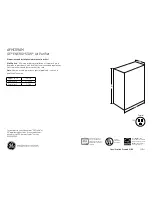
Table of Contents
Installation and operation manual
4
RXYSQ6T7Y1B9
VRV IV-S system air conditioner
4P397285-1B – 2016.03
Table of Contents
About this document..................................................................
Outdoor unit...............................................................................
To remove the accessories from the outdoor unit.......
About the outdoor unit ...............................................................
System layout ............................................................................
Preparing installation site ..........................................................
Installation site requirements of the outdoor unit ........
Preparing refrigerant piping .......................................................
Refrigerant piping requirements..................................
Refrigerant piping material..........................................
To select the piping size .............................................
To select refrigerant branch kits..................................
Preparing electrical wiring .........................................................
Safety device requirements ........................................
Opening the units ......................................................................
To open the outdoor unit.............................................
Mounting the outdoor unit..........................................................
To provide the installation structure ............................
To install the outdoor unit............................................
To provide drainage ....................................................
To prevent the outdoor unit from falling over ..............
Connecting the refrigerant piping ..............................................
Using the stop valve and service port .........................
To connect the refrigerant piping to the outdoor unit ..
Checking the refrigerant piping .................................................
About checking the refrigerant piping ......................... 10
Checking refrigerant piping: General guidelines ......... 11
Checking refrigerant piping: Setup.............................. 11
To perform a leak test ................................................. 11
To perform vacuum drying .......................................... 11
To insulate the refrigerant piping...............................................
Charging refrigerant ..................................................................
Precautions when charging refrigerant ....................... 12
To determine the additional refrigerant amount .......... 12
To charge refrigerant .................................................. 12
Error codes when charging refrigerant........................ 13
To fix the fluorinated greenhouse gases label ............ 13
Connecting the electrical wiring.................................................
Field wiring: Overview................................................. 14
Guidelines when knocking out knockout holes ........... 14
Guidelines when connecting the electrical wiring ....... 14
To connect the electrical wiring on the outdoor unit.... 14
Finishing the outdoor unit installation ........................................
To finish the transmission wiring................................. 15
Making field settings ..................................................................
About making field settings ......................................... 16
To access the field setting components...................... 16
Field setting components ............................................ 16
To access mode 1 or 2 ............................................... 16
To use mode 1 ............................................................ 17
To use mode 2 ............................................................. 17
Mode 1 (and default situation): Monitoring settings ..... 17
Mode 2: Field settings.................................................. 18
To connect the PC configurator to the outdoor unit ..... 20
Precautions when commissioning .............................................. 20
Checklist before commissioning ................................................. 20
Checklist during commissioning ................................................. 21
About test run............................................................... 21
To perform a test run (7-LEDs display)........................ 21
Correcting after abnormal completion of the test run... 22
Operating the unit ........................................................ 22
Solving problems based on error codes ..................................... 22
Error codes: Overview ................................................. 22
Service space: Outdoor unit ....................................................... 23
Piping diagram: Outdoor unit...................................................... 24
Wiring diagram: Outdoor unit ..................................................... 24
System layout ............................................................................. 25
Operation range ......................................................................... 25
Operating the system ................................................................. 25
About operating the system ......................................... 25
About the heating operation......................................... 25
Using the dry program ................................................................ 26
About the dry program ................................................. 26
Adjusting the air flow direction.................................................... 27
About the air flow flap .................................................. 27
Setting the master user interface ............................................... 27
About setting the master user interface ....................... 27
To designate the master user interface (VRV DX)....... 27
About the refrigerant................................................................... 28
After-sales service and warranty ................................................ 28
Warranty period ........................................................... 28
Recommended maintenance and inspection............... 28
Error codes: Overview ................................................................ 29
Symptoms that are not air conditioner troubles .......................... 30
Symptom: The system does not operate ..................... 30





































